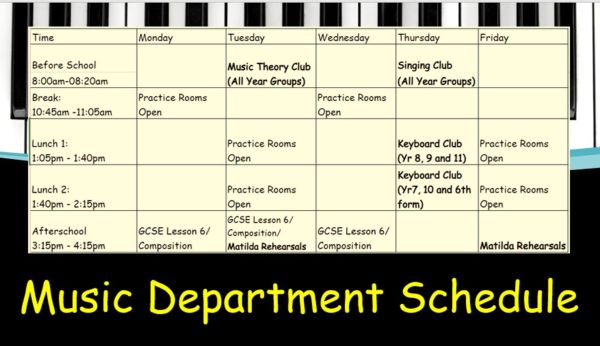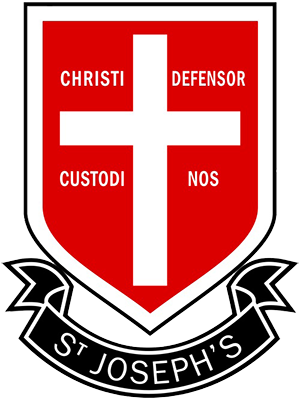Curriculum
Music
Intent
To develop confident and compassionate musicians, using listening, composing and performing music to develop confidence, compassion and creativity in all students.
Overview
The music curriculum at St Joseph’s is designed to ensure that all students can access and enjoy music. Within our intent the main focus of confidence is integral to our ethos within the department as this is the most common obstacle to any student of music developing their ability.
All year groups learn about music through the same 4 areas:
- Understanding
- Listening
- Performing
- Composing
KS3 Music (Years 7,8 and 9)
The KS3 curriculum focuses on exposing students to a wide range of genres in music, as well as developing their skills and experience in using listening, performance and composition skills. Students began using the electric keyboard with opportunities to use djembe’s, guitars, voice and percussion, as well as using any instruments they already learn or would prefer to use.
Year 7 focus on understanding, identifying and demonstrating the musical elements of music, which includes melody, harmony, dynamics and tempo. We also explore how these elements are incorporated into different genres like West African Drumming, Javanese Gamelan, European Folk Music and Impressionism. By the end of year 7, all students should be proficient in identifying changes in music, perform music accurately and compose short ideas.
Year 8 develop their knowledge on the musical elements by applying their skills into more specific genres. For example, they take their knowledge of dotted rhythms and explore syncopation in music from the Caribbean. We also look at structures within music and the impact of historical world events on the progression of music.
Year 9 extend their knowledge of the musical elements, and the skills they have developed so far, by exploring genres like Jazz, Dance and Musical Theatre. Students focus on using their skills to complete pieces of music which incorporate melody and harmony. Students develop their pre-learnt skills further by exploring extended harmony, as well as techniques used in melody and rhythm.
KS4 Music (Years 10 and 11)
Exam Board: Edexcel
Course: GCSE Music
Over GCSE music, students incorporate and develop the skills learned through KS3. The GCSE focuses on 3 main areas of music.
Unit 1: Performance (30%)
Students prepare and complete a solo performance and one ensemble performance.
The performances demand that students perform their piece with accurately, fluently, expressively and with independence. Their performance can be with any instrument or with voice and they are marked on their technical proficiency, as well as their accuracy and expression.
In their solo performance, students need to perform at least one piece of music by themselves, or with an accompaniment. In the ensemble performance, students demonstrate their technical proficiency to perform in a group. They demonstrate their ability to perform in time in a group but also in how to adapt and respond to other performers.
Unit 2: Composition (30%)
Students compose and construct a free composition and an exam composition.
For the free composition, students compose a piece of music in any style, genre, theme or instrumentation they would like. For the exam composition, students choose one of four briefs to compose in the style of. By composing to a specific genre, style, structure or theme, students demonstrate their ability to compose music with specific contexts in mind. This includes using different techniques used in all of the musical elements to convey that style.
Unit 3: Listening and Appraising (40%)
For this unit, students are tested on their knowledge of reading, listening and writing about music in order to analyse pieces of music. This is completed through a listening exam (1hr45mins) where students are played extracts of music and answer questions about the different features used in the music. The music selected is a mixture of set works to be studied (familiar) as well as pieces which are not studied (unfamiliar). Additionally, students are tested on ability to notate music through dictation and their understanding of different pieces of music by comparing two pieces of music.
Year 10 students will focus on their foundational skills and ensuring they are confident in identifying the musical elements and how to use them when writing about music. Additionally, students develop their autonomy in performance and composition further by completing Solo and Ensemble performance projects, as well as composition projects. Year 10 is also where students are taught how to use music technology in greater depth, in order to use the programmes to develop their compositional work. At the same time, students will complete studying 7 of the 8 set works. At the end of year 10, students take part in an end of year exam which includes a recorded performance (Unit 1), a composition (Unit 2) and a 1 hr listening exam (Unit 3)
Year 11 students use the first term to complete the final set work of study as well as review their knowledge of the set works studied in year 10. Simultaneously, students work on their solo and ensemble performances to aim to have them recorded by February. In September, work starts on the exam composition once the briefs are released by the exam board. By PPE 2(March) all students should have completed their solo and ensemble performances and finished most of their compositions, which allows the remaining time to be spent on improving and reviewing areas of weakness.
KS5 Music (Years 12 and 13)
Exam Board: Pearson
Course: BTEC Level 3 National Extended Certificate in Music Performance
This course allows students to develop practical experience in applying their skills to real-world scenarios. As well as reviewing their knowledge in musical theory, performance, composition and analysis of music, students also learn about the music industry. One of the best advantages of this course, is that the choice of units cater the needs and strengths of the students. The Units are completed over Year 12 and 13, in the order which best suits their needs. Two of their units are completed internally, and two in the form of external examinations.
Mandatory Units:
Unit 1: Practical Music Theory and Harmony (Internal) – Students develop and extend their understanding of music theory and different types of notation, and demonstrate how to use these techniques effectively to produce music.
Unit 2: Professional Practice in the Music Industry (External) – Students learn about the different areas of the music industry, which incorporate fundamental elements of business and law. This exam requires that students use their skills and knowledge of the music industry to research, develop and plan the running of an event (e.g. a tour, album launch, wedding music) which includes a plan, budget and pitch to a prospective employer.
Unit 3: Ensemble Performance (External) – For this exam, students are tasked with developing a performance of 3 pieces of music, with each piece being arranged in a different way to its original. This unit places students into the real-world scenario of developing a unique sound as musicians, as well as balancing rehearsal time, analysis and experimenting with different genres and techniques. As part of the examination process, students are video recorded
Optional Units: Students choose one of the following optional units to complete their BTEC qualification. This is usually decided on the students’ prospective career choices, but also in terms of their strengths.
Unit 4: Composing Music – Developing understanding of different composition techniques, conventions of different styles and develop a portfolio of work. Assessed with students composing a variety of work.
Unit 5: Session Styles – Developing an understanding of performance within the music industry and the demands it requires as a profession. Assessed with students planning and performing as a session musician
Unit 6: Solo Performance – Developing skills as a solo musician, which includes rehearsals, hiring musicians and rehearsal spaces. Assessed through a range of rehearsal logs (written or video) and a final performance recital.
Unit 7: Improvising Music – Developing and extending knowledge of music theory to improvise music in a variety of genres. Assessed with students performing improvisations during a live performance.
EXTRA CURRICULAR
At the moment, we run Music Theory Club, Singing Club and Keyboard Club in addition to music lessons. We also support in the running of the school productions which have rehearsals, and provide 1:1 support for GCSE students, after school during the week.
There are opportunities for students to use the practice rooms to develop their own practice on any instruments.

As well as the extra-curricular timetable, there are opportunities for music in the elective programme: Digital Music Production, Guitar Club and Saxophone Club.
CAREERS IN MUSIC
In music lessons, we have frequent discussions about how music skills can transfer to a variety of subjects, and how learning music helps develop essential skills like practice, time-keeping, organisation, self-reflection, feedback, projection and presentation, and many more. Alongside lessons, students have opportunities to compose or perform music at other locations, as well as participating in talks with different professionals within the music industry.
When preparing for university and working life, we discuss the different options for students and the kinds of requirements different institutions need, as well as the expectations students will need to demonstrate in order to be successful in those careers.
Careers Information:
- https://www.careersinmusic.com/music-careers/
- https://www.prospects.ac.uk/jobs-and-work-experience/job-sectors/creative-arts-and-design/careers-in-music
- https://www.businessnewsdaily.com/9997-best-jobs-music-lovers.html
CONTACT US
For further information regarding Music please contact the following:
- Miss Kayleigh Ure (Head of Music) - K.ure@st-josephs.slough.sch.uk
